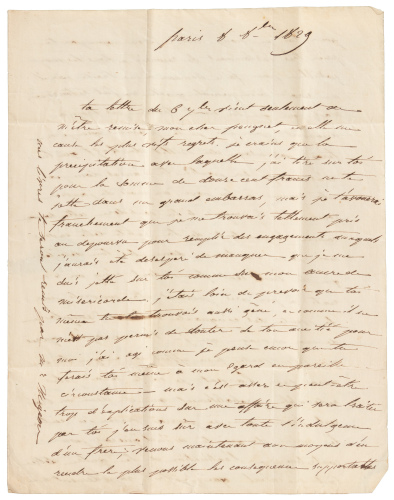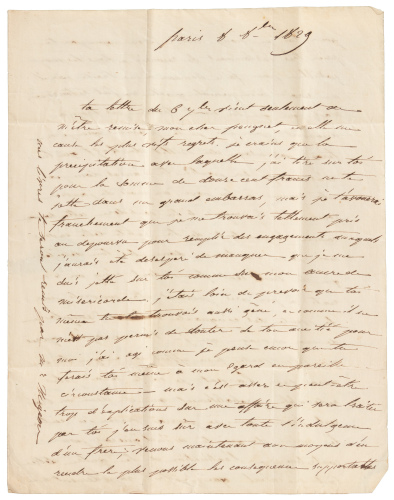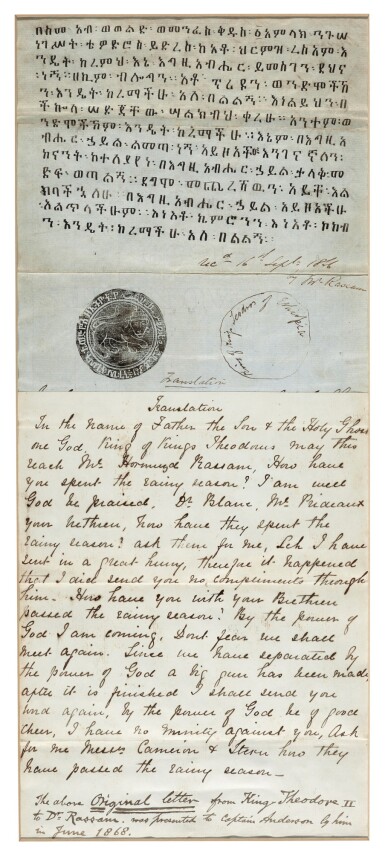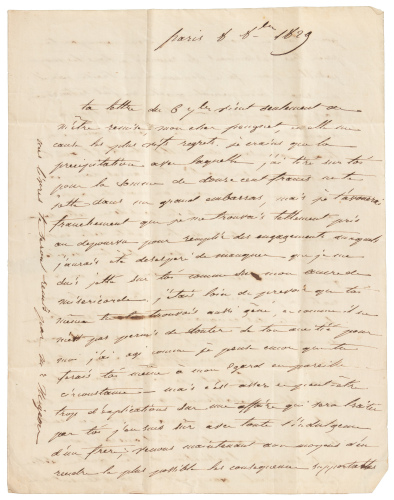Title: Rare letter by the Army map-maker on an expedition that later led to the Indian "Trail of Tears" Author: Hood, Washington Place: Mobile Point, Alabama Publisher: Date: 1829 Description: Wash.[ington] Hood. Autograph Letter Signed as US Army Lt. and Engineer. Mobile Point, Alabama. July 27, 1829. 3pp.+ stampless address leaf. To John S Holloway, Philadelphia. “...my return from the Canadian waters, whither I was directed to attend an expedition composed of deputations from three tribes of Indians, via. Choctaw, Chicasaw & Creek, in the capacity of Topographer...This expedition occupied me two months…during which time I can scarcely say I was off my horse except for sleep: as we took breakfast at daybreak every day before starting & continued until sunset before we again took any nourishment: as there is no settlements in the greatest part of that country, we were exposed continually to the weather, and at night we sought some stream where we could repose ourselves until next morning. We passed through the land ceded by the United States to the three tribes…”, and had their natural “curiosity gratified”. Despite these adventures, the 21 year-old West Point graduate was an unhappy young man, as he writes: “Since my return from Arkansas, I have scarcely received any news from any of my friends…I still rest in hope that I am not altogether forgotten. I know very well that this is the general custom of the world, but still I cannot think that it is one which evinces the best feeling. Why do we live? If it is not on account of those whom we esteem and love; take these away and man becomes a desolate and a miserable being, reckless of the past or future he hurried on in his mad career, until the friendly grave closes his little span. I feel strongly the pain of being, as it were, outcast, as the situation which I hold brings me very near that character, or in fact that which differs from it so slightly that one might be taken for the other, viz. a wanderer and for this I wish to God I had never known anything about it, for I have found to my sorrow ‘that of all the ills unhappy mortals know / A life of wand’ring is the greatest woe!’…. Born in Philadelphia to a wholesale grocer, Hood was undistinguished in a West Point class that included future Civil War Generals Sibley, Buford, Polk and Cooke. First detailed to the Infantry at Jefferson Barracks, Missouri, he was one of four Army officers (plus interpreters, hired crew members and servants) assigned to escort a deputation of Indians from three tribes then living in the southwestern US to tour lands west of the Mississippi River where the Government hoped to “relocate” them. The full party of 42 men moved west from Missouri, then south to Fort Gibson in present-day Oklahoma, from there touring the country around the mouths of the (misnamed) Canadian River. Two years later, Congress passed the “Indian Removal act” which forced six entire tribes of Native Americans to trek westward along a “Trail of Tears” on which 10,000 died of disease and starvation. Hood, meanwhile, became an officer of the newly-formed Army Corps of Topographical Engineers, sent on a variety of surveying and mapping assignments, including one along the Ohio-Michigan boundary, in partnership with Lt. Robert E. Lee. After working for a year as a civil engineer in Cuba, he reentered the Army as a Captain only to fall ill while surveying timberland bordering Arkansas and Missouri. Ten years after the he wrote this letter, the gloomy young man died at the age of 32. Various Hood drawings and papers are scattered among several institutional collections, but there are few letters of this early date and, apparently, no other significant references to his 1828 Indian expedition. Lot Amendments Condition: Very good. Item number: 271716
Title: Rare letter by the Army map-maker on an expedition that later led to the Indian "Trail of Tears" Author: Hood, Washington Place: Mobile Point, Alabama Publisher: Date: 1829 Description: Wash.[ington] Hood. Autograph Letter Signed as US Army Lt. and Engineer. Mobile Point, Alabama. July 27, 1829. 3pp.+ stampless address leaf. To John S Holloway, Philadelphia. “...my return from the Canadian waters, whither I was directed to attend an expedition composed of deputations from three tribes of Indians, via. Choctaw, Chicasaw & Creek, in the capacity of Topographer...This expedition occupied me two months…during which time I can scarcely say I was off my horse except for sleep: as we took breakfast at daybreak every day before starting & continued until sunset before we again took any nourishment: as there is no settlements in the greatest part of that country, we were exposed continually to the weather, and at night we sought some stream where we could repose ourselves until next morning. We passed through the land ceded by the United States to the three tribes…”, and had their natural “curiosity gratified”. Despite these adventures, the 21 year-old West Point graduate was an unhappy young man, as he writes: “Since my return from Arkansas, I have scarcely received any news from any of my friends…I still rest in hope that I am not altogether forgotten. I know very well that this is the general custom of the world, but still I cannot think that it is one which evinces the best feeling. Why do we live? If it is not on account of those whom we esteem and love; take these away and man becomes a desolate and a miserable being, reckless of the past or future he hurried on in his mad career, until the friendly grave closes his little span. I feel strongly the pain of being, as it were, outcast, as the situation which I hold brings me very near that character, or in fact that which differs from it so slightly that one might be taken for the other, viz. a wanderer and for this I wish to God I had never known anything about it, for I have found to my sorrow ‘that of all the ills unhappy mortals know / A life of wand’ring is the greatest woe!’…. Born in Philadelphia to a wholesale grocer, Hood was undistinguished in a West Point class that included future Civil War Generals Sibley, Buford, Polk and Cooke. First detailed to the Infantry at Jefferson Barracks, Missouri, he was one of four Army officers (plus interpreters, hired crew members and servants) assigned to escort a deputation of Indians from three tribes then living in the southwestern US to tour lands west of the Mississippi River where the Government hoped to “relocate” them. The full party of 42 men moved west from Missouri, then south to Fort Gibson in present-day Oklahoma, from there touring the country around the mouths of the (misnamed) Canadian River. Two years later, Congress passed the “Indian Removal act” which forced six entire tribes of Native Americans to trek westward along a “Trail of Tears” on which 10,000 died of disease and starvation. Hood, meanwhile, became an officer of the newly-formed Army Corps of Topographical Engineers, sent on a variety of surveying and mapping assignments, including one along the Ohio-Michigan boundary, in partnership with Lt. Robert E. Lee. After working for a year as a civil engineer in Cuba, he reentered the Army as a Captain only to fall ill while surveying timberland bordering Arkansas and Missouri. Ten years after the he wrote this letter, the gloomy young man died at the age of 32. Various Hood drawings and papers are scattered among several institutional collections, but there are few letters of this early date and, apparently, no other significant references to his 1828 Indian expedition. Lot Amendments Condition: Very good. Item number: 271716















Try LotSearch and its premium features for 7 days - without any costs!
Be notified automatically about new items in upcoming auctions.
Create an alert